Last Chance to Catch NYC's Holiday Notalgia Train
We met the voices of the NYC subway on our nostalgia ride this weekend!


We often encounter police officers cruising around in blue and white sedans, but did you know that the New York City Police Department (NYPD) actually employs a fleet of over 10,000 vehicles citywide? As you can imagine, keeping the chaotic jungle that is New York City safe is no easy feat, but “New York’s Finest” utilizes varied means of transportation to (miraculously) do the job, ranging from adorable smart cars and scooters to SWAT vans and cruisers.
Each type of vehicle serves a specific purpose in helping officers carry out their duties, whether it is used everyday on the streets or only for special occasions. As the largest police force in the United States, the NYPD makes use of over 1,500 motorcycles, 55 horses, an aviation unit consisting of helicopters and other anti-terrorism aircraft, and a harbor unit that patrols the city’s waterways. Listed below are 10 of the most unique and unconventional NYPD vehicles you may have encountered over the years:
Although a yellow car may seem like the most conspicuous vehicle, it’s the best way to hide in plain sight in New York City. According to online reports and eye witness accounts, several of the NYPD’s approximately 899 unmarked cars are disguised as yellow taxi cabs. The cars look like any other taxi until their lights start to flash and their sirens start blaring. An Untapped Cities reader told us that while riding in a standard taxi, his driver was pulled over by an undercover NYPD cab and issued a ticket!
If you have a keen eye, you may be able to discern a police cab from the rest. According to taxi enthusiast and photographer, Herman Yung, the cars may be driven by undercover or uniformed officers, and have a license plate that starts with 2W or 6Y. There will likely be no plastic divider between the front and back seats, and the meter will be fake or nonexistent, but there may be a computer set up in the front of the car.
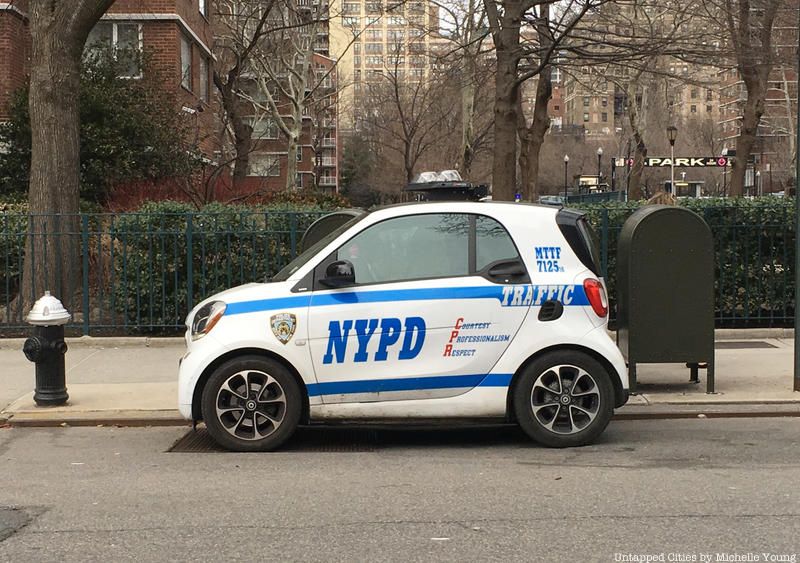
The smaller, more compact cousin of the sedan tends to bring out smiles from even the grumpiest of New Yorkers. In 2015, former police commissioner, William J. Bratton, announced plans to roll out single passenger Mercedes-Benz smart cars to replace the covered three-wheeled scooters officers had been using. The smart cars are faster, cheaper and more roomy than the boxy scooters, and have features like air conditioning and air bags, which make them safer and more comfortable for officers to drive. An unexpected perk of the tiny vehicles is that they seem to make police officers more approachable. When the cars first hit the streets, the public quickly became enamored with them, flooding social media with pictures of themselves standing alongside the cars and officers driving them.
The department now employs over 200 smart cars, the most found in any police department in the country. The mini cruisers are used mostly for ticketing and patrolling in areas that larger cars can’t access, like the pathways of Central Park.
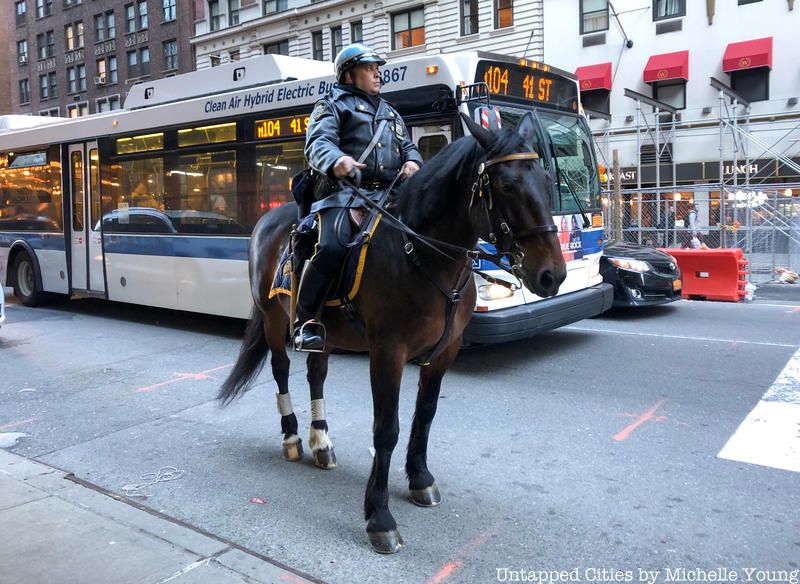
At some point or another, you’ve likely had the urge to stroke the mane of an on-duty police horse. As police cruisers get smaller, more efficient and more hi-tech, horses — a part of the police department since 1871 — may seem a little out of place. However, they still provide officers with a fundamental service: a boost in height.
Riding atop a horse gives officers a 10-foot-high vantage point, allowing them to see over crowds and farther distances. The added height of a horse also makes officers easier for civilians to spot. Moreover, horses are able to walk through pedestrian plazas and fit down narrow alleyways that are unnavigable for cars. Today, the city has approximately 55 mounted officers, who help with traffic control, crowd control, counter-terrorism, prevention of street crime, and community relations. Read more about them here.
In the fall of 2017, the NYPD acquired a powerful tool in the fight against terrorism: a plane with radioactive detection capabilities (see photos here). The new aircraft, which can fly for up to six hours, covering a distance of 200 nautical miles, scans yachts, cargo vessels, and other ships around the city for radiation that could indicate the presence of a bomb on board. Pilots of the plane can instantly communicate a threat to the NYPD and the Coast Guard should they detect anything suspicious from the air. When the plane is not scanning the waterways for radioactive signals, it is used for search and rescue missions, and to discreetly track criminal suspects.
The new plane is now part of the oldest police aviation unit in the country. Created in 1928, the NYPD aviation unit has been based in Brooklyn’s Floyd Bennett Field since 1929. Its central location allows police helicopters to quickly reach all five boroughs of the city. NYPD helicopters are outfitted with heat sensing cameras, advanced mapping technology, and hoists that allow the aircraft to be used for anything from river rescues to chasing perpetrators.
These formidable black trucks may seem like they come straight out of an action movie, but they’re actually used by the Emergency Service Unit of the NYPD Special Operations Bureau, which is comprised of specially trained officers equipped to handle any emergency, ranging from hostage situations to hazardous material containment. Due to the department’s versatility, the ESU uses many different types of vehicles, most notable among them the Bearcat armored trucks.
They were first added to the force in 2004, and feature bullet proof windshields and ports that allow officers to use their weapons from within. The heavy duty protection afforded by these vehicles allows officers to respond to high risk situations, such as inmate escapes and SWAT operations.
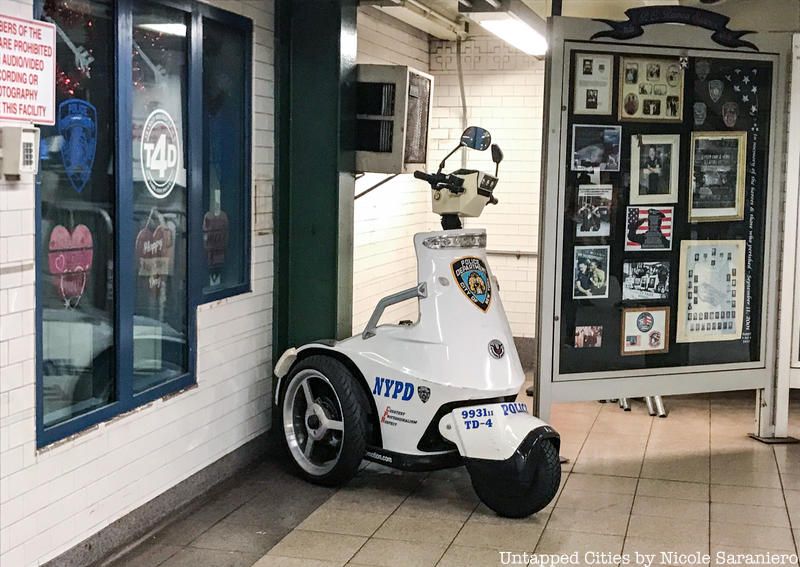
Though the Segway will always have a special place in our hearts, police officers patrolling indoor areas — such as the subway, and sites with high levels of pedestrian traffic like Citi Field and Yankee Stadium — were equipped with T3 Scooters in 2010. These three-wheeled, electric people-movers give officers just enough height to allow them to see above crowds without making them imposing and unapproachable. The scooters can travel as fast as 20 miles per hour, are 100% emission free, and can hold a charge for days since they have two batteries.
Additionally, T3 Scooters allow officers to navigate pedestrian areas much faster than they could on foot while simultaneously eliminating unnecessary fatigue they may experience from running and walking.
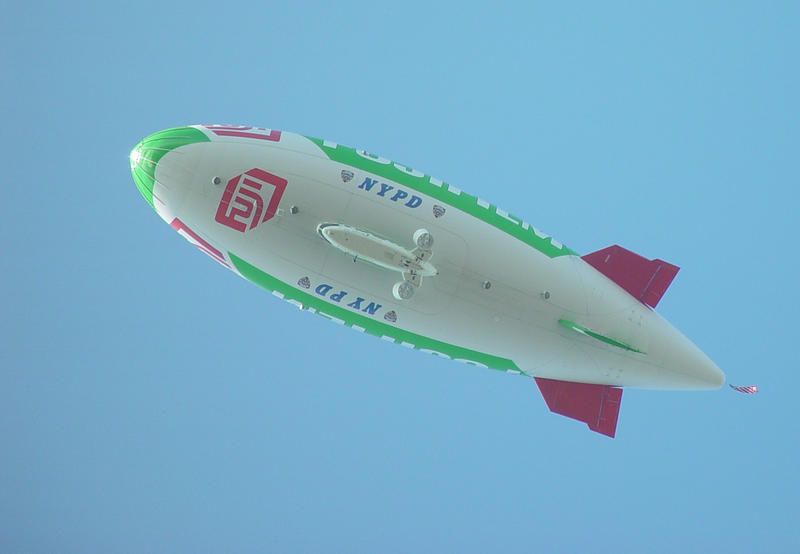 Image via Wikimedia Commons: Jonathan McIntosh
Image via Wikimedia Commons: Jonathan McIntosh
During the 2004 Republican Convention at Madison Square Garden, the NYPD made use of a blimp to monitor activity. NYPD Deputy Commissioner at the time, Paul J. Browne, stated that the department went with the FujiFilm-sponsored blimp because it could stay in the air for up to 16 hours, a much longer period of time than a helicopter could.
Police officers were also able to get crystal clear, real-time images of aerial scenes, which helped forces on the ground. The director of communications for Fujifilm at the time even told CNN that the NYPD had used the blimp to monitor activity at Yankees games, the U.S. Open tennis tournament, and the July 4th fireworks show.
Video via NYPD Instagram
It’s the sad truth that New York City is no stranger to bomb threats. That means the NYPD bomb squad must be ready to respond 24/7. Federal grants allowed the department to obtain a state-of-the-art truck, equipped with a robotic bomb diffuser and a total containment vessel (TCV).
Used to transport suspected explosive devices, the total containment vessel was employed in 2016 when a suspected bomb was found on 27th Street. The TCV is built to contain flying debris and powerful shockwaves that could be released from a blast. This allows for the NYPD to move devices safely through the public without a need for evacuation and without putting people and property in danger.
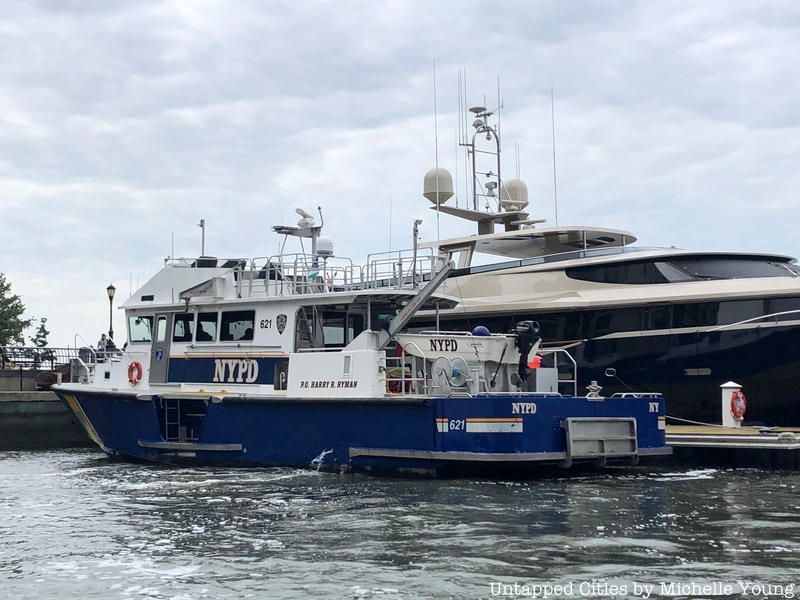
Out of the nearly 40,000 officers on the New York City force, only a few hundred are specially trained for its aviation and harbor units. The NYPD harbor unit, which polices all 150 miles of New York City’s navigable waterways, is made up of officers and divers on the NYPD SCUBA Team. It makes use of 29 crafts, ranging in size from 45 to 70 feet. The boats are also equipped with sonar and radiation detection capabilities to scan the waters for potential threats.
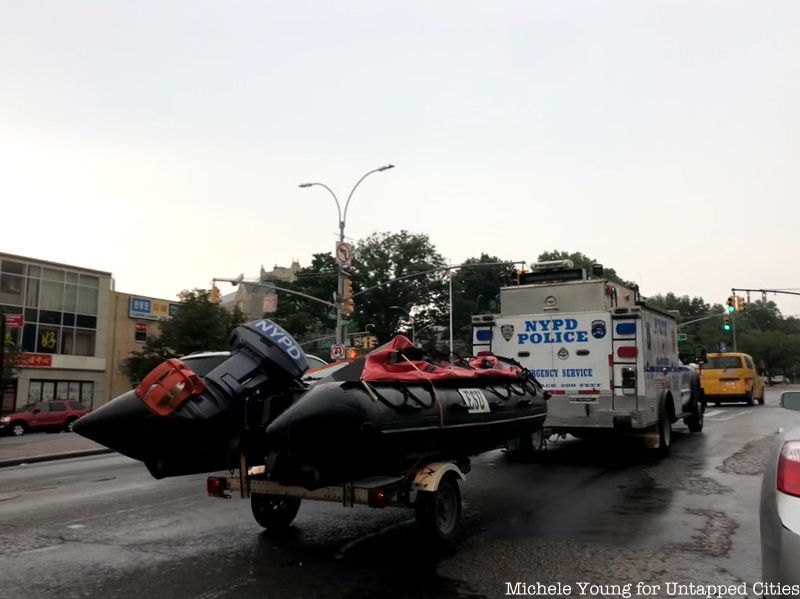
As part of its scope of work, the harbor unit responds to calls for situations ranging from swimmers in distress and disabled boaters to bridge jumpers.
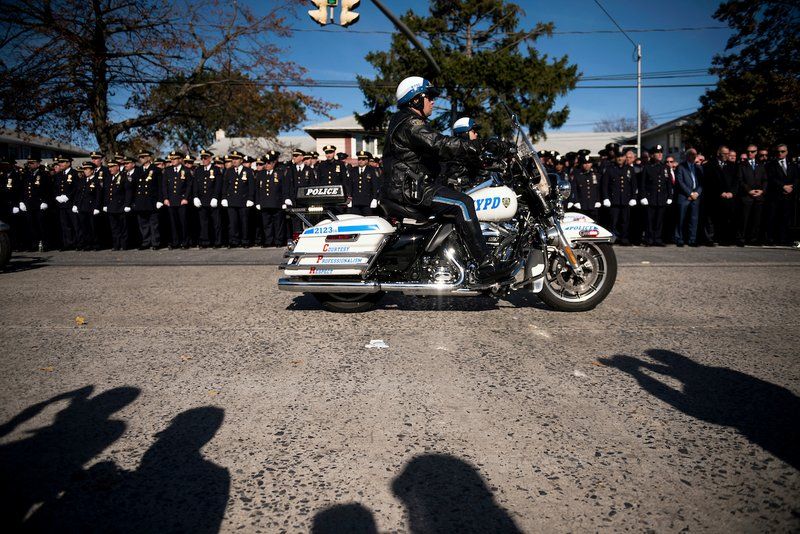
Photo: Ed Reed/Mayoral Photography Office
A Harley-Davidson isn’t just reserved for bearded motorcyclists. The NYPD Highway Patrol began in 1911 with the creation of the agency’s first motorcycle squad, which was established to patrol and maintain safety on limited-access highways. Prior to its formation, the NYPD “Bicycle Squad” was tasked with catching horse-drawn carriages, but the advent and proliferation of automobiles made it virtually impossible for officers catch determined speeders using a bicycle (though it’s humorous to picture).
“To become a member of the NYPD’s Highway District you have to complete several months of training covering everything from motorcycle skills, to collision investigation, to shotgun use,” said Police Commissioner O’Neill of the job. “As a result of your efforts and skills you now belong to one of our oldest and most storied specialized units.”

Next, discover the Top 10 Secrets of the NYPD and read about Why NYPD Floodlights Are Illuminating NYC Parks and Housing Developments.
Subscribe to our newsletter